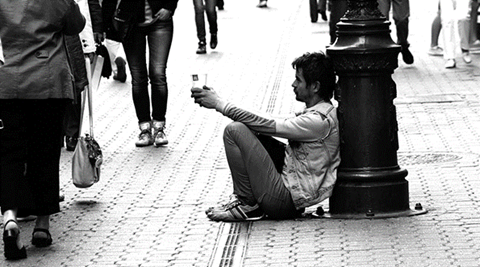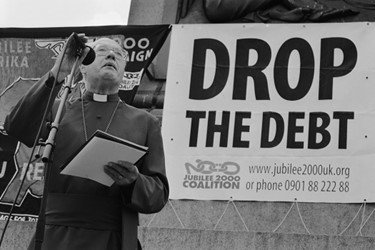
All Saints’ Day
Today is All Saints Day, a day when we celebrate, not just the saints who forged out faith and inspired us, but also our own calling to be saints. Both of our readings speak of difficulty, and of the hope that allows us to continue to thrive in the face of those difficulties. Daniel 7:1-3, 15-18 gives us a vision of the ocean (the symbol of chaos) from which rise 4 beasts. But despite the strength of the beasts, Daniel is assured that the arc of history will bring justice and peace. Luke 6:20-31 gives us the beatitudes: blessed are the poor, blessed are the hungry, blessed are those who mourn. These do not seem like blessings, but the blessing is in the reversal: those who are poor WILL inherit the kingdom, those who are hungry WILL be filled. The church, the saints, are called to stand in the middle, between the struggle and the triumph: we are the ones who are to fill the hungry, we are the ones to bring joy to those who weep. Today, together with the PCC, we will explore the ways in which we might be called to be the agents of reversal and the agents of blessing in this place.

Last Sunday after Trinity
Our Gospel reading is a sneaky one this morning: Jesus, Luke 18:9-14, tells a parable of the pharisee who prays out loud, assured of his own righteousness, and judgemental of the tax collectors mumbling his prayers in the corner. The tax collector is convinced only of his own failures, yet he is the one who Jesus calls justified. Our instinctive reaction is to judge the pharisee but in doing so we commit the same sin: we are the included not the includers, we are the judged not the judges. Nothing we do, for better or for worse, will make God love us more. And nothing we do will make God love us less. Our ‘righteousness’ or ‘justification’ is the work of God and God alone. As Jeremiah 14:7-10, 19-22, reminds us “we set out hope on you, O Lord our God, for it is you who does all this.”

Eighteenth Sunday after Trinity
Our readings this week focus on the effort involved in living a life of faith. In Genesis 32:22-32 Jacob wrestles all night with the divine; in Luke 18:1-8 Jesus gives us a role model of persistent prayer. The story of Jacob wrestling the angel is one of my favourites: the life of faith is not without risks. At the end of the struggle Jacob is left with both a wound and a blessing. We might wonder whether the struggle is worth it. Jacob has everything he could have wanted in life: status, prosperity, family, yet he is restless and discontent. More than this, he is stuck, he cannot move forward. His night of wrestling with God provides him with direction and meaning and, finally, he can move on to a fuller life. This morning we celebrate the long and devoted ministry of Mother Caroline. Someone who has never shied away from the struggle, and is persistent in her wrestling with the divine on behalf of a whole community.
Seventeenth Sunday after Trinity
Today we celebrate the Harvest Festival. Our readings try to get to the heart of why we celebrate harvest and what makes it relevant for us.
When the people of God bring their first fruits, Deuteronomy 26:1-13, they are encouraged to recall their history: that a stranger and a foreigner was their ancestor, that they were slaves, that God liberated them and gave them a land of plenty. Having been reminded that they once had nothing and were dependent on the goodness of God and others, the people are sent home to feast, not only with their families, but with the slaves and foreigners and strangers in the land. After the festival is over, the people of God are reminded that they should be putting aside a share of their wealth every year to give to those who are most needy in their community.
In the Gospel, John 6:32-35, Jesus explains that we give not just to help others but to help ourselves: building community, giving of ourselves, sharing with others is what brings us life.
At harvest time, as we give thanks for all the gifts we enjoy, we are challenged to think about how we can live abundantly and help to build a community of plenty.

Sixteenth Sunday after Trinity
Today we celebrate the feast of St Michael and All Angels and our readings focus on the image of the angelic ladder stretched between earth and heaven. In Genesis 28:10-17 Jacob dreams of this ladder and, although God tells him he will be with him wherever he goes, Jacob sees the ladder as fixed in this one particular holy place. Jesus though, in John 1:47-51, describes himself as the ladder between heaven and earth. In baptism we too become like Christ, christened, and we are all called, from the littlest to the greatest, to be ladders between heaven and earth, lifting others to God and bringing God’s love to them.

Fifteenth Sunday after Trinity
This week’s readings are both about the way in which the concerns and the pleasures of life can prevent us from connecting with one another and perceiving our innate interdependence. In Amos 6:1-7 the prophet is criticising the rich and idle. He is not, however, rejecting abundance, pleasure, enjoyment - these are good gifts from God to be enjoyed - but to their tendency to isolate us from one another. Jesus in Luke 16:19-31 gives us an example: the rich man in his story cannot even see Lazarus; he is invisible to him, although he sits at his gate daily. On earth there is a great gulf between them: not a geographical one but one caused by the difference in their stations in life. The rich man could have bridged this distance but was too preoccupied to do so. Now he is concerned for his own brothers, still not seeing that Lazarus is also his brother - still not able to reach across the distance between them.

Sunday 18th September, 6.30pm
Service of Thanksgiving, Sunday 18th September, 6.30pm
A special commemoration service marking the death of her late majesty Queen Elizabeth II.

Fourteenth Sunday after Trinity
Last week Jesus was praising a shepherd who abandoned his 99 sheep to go looking for a lost one. This week he’s applauding a manager who gives away his master’s goods, (Luke 16:1-13).
At the start of the story the manager is in solidarity with the master, the one with wealth and power. By the end of the story, he is in solidarity with the debtors, those with little wealth and power (echoing the call of the prophet in our first reading, Amos 8:4-7). Irrespective of his motives, his actions ease the burden of the poor. Once he acknowledges his own insecurity, his own vulnerability, he acts to lessen the insecurity and vulnerability of others. We might (reasonably) complain that he does so by giving away what is not his in the first place. But in God’s radical economy, nothing is truly ours. All that we have - our life, our breath, our relationships, our talents - are a gift from God. If we share them, there will be enough for all God’s children.

Twelfth Sunday after Trinity (Parish Eucharist and Baptism)
This Sunday we celebrate a baptism and the welcoming of a new member to our church and to the family of God. When considering our Gospel reading Luke: 14:25-33, it is important then to look at the use of “love vs hate” in the gospel. It is meant to indicate what happens when we choose one path over another: if you follow one master you are unable to follow another. When we become part of the family of God, that family takes priority. We can no longer consider just the needs of our own household, our own aged parents, our own vulnerable little ones; our concern necessarily expands to all aged parents and all vulnerable little ones. Love is no longer privatised, it is set free to embrace those God embraces. Jesus then goes on to tell the story of a man building a tower and a king going to war; neither have the resources to finish the job. We will never have the resources to love the entire world, no matter, God is a God of abundance, when we take our place in the economy of God’s love we receive much more than we are able to give.
